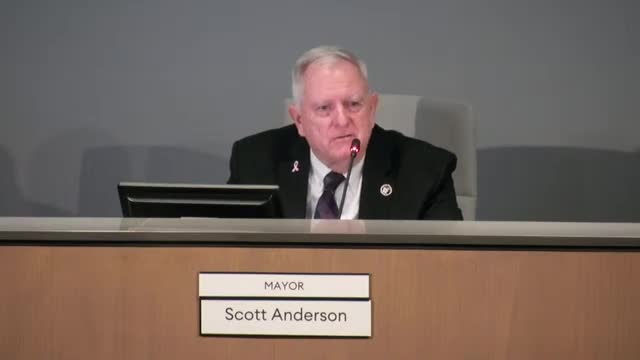Gilbert orders independent audit, expands support after spike in water bills; no late fees until results public
Get AI-powered insights, summaries, and transcripts
Subscribe
Summary
Town staff told council and residents an independent audit of AMI meters and the radio system will be hired; the town will expand customer support, extend a billing grace period and correct any errors identified after widespread complaints about higher bills following recent meter replacements and a billing portal rollout.
The Town of Gilbert will hire an independent contractor to audit its advanced metering infrastructure (AMI) radios and meters and publish the results publicly, Public Works Director Jessica Marlow told the Town Council at its Oct. 14 meeting as frustrated residents filled the chamber to complain about unexpectedly high utility bills.
Marlow said the town has changed out about 3,400 meters this year and that 14 were sent back for warranty issues — about 0.4 percent — and that newer meters can register low flows that older mechanical meters sometimes missed. "Old meters often under report when they start to fail," Marlow said, and the vendor testing documentation shows new meters meet AWWA standards for accuracy. She also said the town received several million dollars in Bureau of Reclamation grants to help fund the AMI conversion program.
The immediate actions Marlow and council described include: hiring an independent auditor to verify meter and AMI radio accuracy; a public report of audit findings and corrections; expanded customer-service and water-efficiency staff to reduce call wait times and provide more on-site checks; continuing meter testing and adjusting bills where errors are found; and extending the transition grace period so there will be no late fees or disconnections until the audit is complete. "For complete transparency, anything that is found as a result of that audit will absolutely be corrected," Marlow said.
Why it matters: Residents across Gilbert reported sudden, large jumps in bills after the town implemented a new billing portal and replaced meters. The town said multiple factors can combine — rate increases, meter replacements that read more accurately, unpaid balances carried over during the portal switchover, increased summer irrigation, and undetected leaks — and agreed to a publicly available audit to confirm accuracy.
Supporting details: Marlow said the town adopted rate increases in two recent steps — a 50 percent increase in April 2024 and a 25 percent increase in April 2025 — and implemented a $30-per-month sewer rate increase in April 2025 that increased average bills by roughly $40 with consumption held flat. She also noted that the AMI radio program has been installing radios since 2020 and that about 52,000 radios have been installed so far. "We have over 90,000 utility customers," Marlow said, and the town expects some anomalies as meters and communications are updated.
Residents and council members pressed for faster, concrete relief. Councilmember Chuck Bongiovanni described personal experience with multiple concurrent problems — a broken, 20-year-old meter and many irrigation leaks — and asked the town to proactively notify customers when reads show sharp spikes so staff can send crews instead of waiting for customers to call. Marlow said staff historically monitored alerts and will resume that practice as soon as the new system reliably provides them; the town is also examining ways to do some of that work manually in the interim.
What the town will not do yet: Marlow and others explicitly stopped short of promising rate rollbacks. They described the rate increases as "non-negotiable" for funding the North Water Treatment Plant reconstruction, nine new wells for drought resilience, and other capital work intended to prepare the town for reduced Colorado River supplies in 2027 and beyond. Marlow said a three-year phased rate approach was adopted in April 2024 and the third-year increase proposed for April 2026 is still being evaluated by the council.
Next steps and resident resources: The town said it will expand intake capacity for customer service and water-efficiency checkups, offer free water-conservation workshops, continue rebates for irrigation controllers and xeriscape conversions, make water-efficiency checkups more widely available, and host listening sessions in the next 30–60 days for two-way public discussion. Residents were also told they can request meter testing and that if a meter error is confirmed, the town will adjust the bill.
Council and public reaction: Several speakers said they had received large, unexplained bills (one resident recounted a 292,000-gallon bill). Former mayoral and council debates about budgeting and long-term infrastructure funding were raised by councilmembers during discussion. Councilmember Jim Torgerson emphasized the legal separation of enterprise funds, saying water and sewer funds are dedicated and cannot be used for other municipal purposes; he also urged better public outreach. Councilmembers voted on other agenda business but did not take a councilwide formal vote on new rate decisions at this meeting.
The town requested that residents with billing questions contact utility billing directly, make use of onsite customer-service staff available in the lobby, and submit requests for meter testing; staff promised to publish the full audit results and to adjust bills where errors are found.
Ending: The council and staff framed the audit and extended grace period as short-term steps to restore public confidence while acknowledging the long-term fiscal needs that drove recent rate decisions. The town said it will report back publicly after the audit is complete and will continue outreach and listening sessions to address remaining community concerns.
